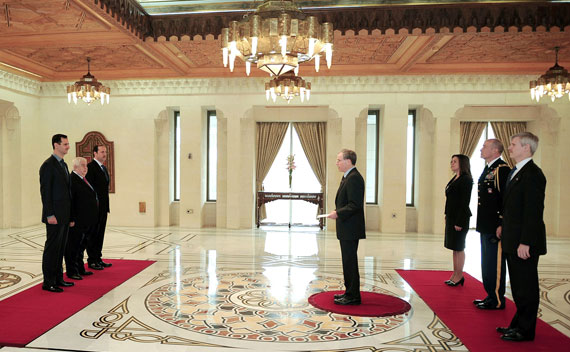MEPI, Syria, And The Washington Post
More on:

The DC Middle East watching community is abuzz with a front page article in today’s Washington Post titled “U.S. Secretly Backed Syrian Opposition Groups, Cables Released by Wikileaks Show.” The whole thing sounds kind of spooky (in that espionage kind of way) and sinister. The tone of the piece only adds to the sense that Washington has been up to no good in Syria. Upon closer examination, though, it seems what has gotten everyone’s attention is little more than journalistic haymaking.
The last time I checked there was bipartisan support on Capitol Hill—no easy feat—for promoting democratic change in the Middle East. Washington does this through the U.S. Agency for International Development, the State Department’s Bureau of Democracy, Labor, and Rights, and the Middle East Partnership Initiative (known universally as MEPI). In 2009, Congress voted—across party lines—to increase funding for democracy promotion efforts in Egypt for the 2010 fiscal year. The best thing about MEPI is the fact that its grantees are a self-selecting group. If democracy activists want U.S. assistance, they can apply for it. MEPI representatives aren’t standing in Martyrs’ Square in downtown Damascus pushing U.S. taxpayer dollars on people.
Beyond how the money is actually distributed, it is important to keep in mind what MEPI actually does—it helps to promote civil society, economic reform, women’s empowerment, rule of law, and quality education. These are all components of healthy democratic societies. What is so bad or sinister about that? If Syrian activists in exile want to take U.S. funds to promote their cause and the professional staff that evaluates their applications, deem these groups worthy, that’s a good thing. I am not exactly sure that this is front page material.
I don’t mean to be shilling for MEPI. In the past, I have been critical of the way money is spent on democracy and good governance programs in the Middle East, but not the actual goals of democracy and good governance. The Post turned something for which Americans should rightly be proud—advancing the cause of democracy and freedom in a country that has precious little of both—into something that seems pernicious. That’s unfortunate because it will do more to harm those working toward democratic change in Syria than the MEPI grants themselves.
More on:
 Online Store
Online Store